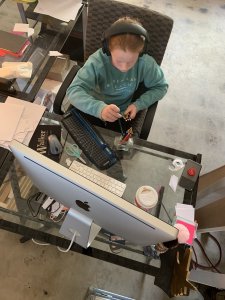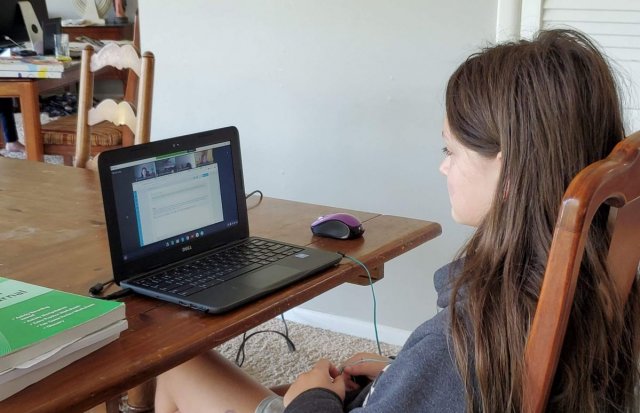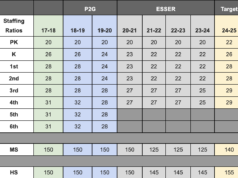
Succeeding in the world of virtual learning can be difficult for students. It can also be difficult for single parents who are now wearing the hat of caregiver, teacher and financial provider.
Home offices have been turned into makeshift classrooms, kitchen tables are now school desks and parents are doing extra planning around their usual work day to ensure that their children are still able to get the education they deserve.
Liz Turner has a third and fifth grader that attend Zarro International Elementary School, a sixth and eighth grader that attend Carver Middle School and a child in pre-k in Tulsa Public Schools. The children attend multiple Zoom meetings a day, four days a week, while completing all of their usual curriculum virtually.
Turner, however, also works full-time for a promotional company, and while her workplace is family oriented, she knows those allowances can only go so far.
“I am uniquely lucky in that my work is very understanding and family oriented, but anyone could lose their job basically,” Turner said. “It’s in the back of your mind: My work is great, they support families and they let me bring the kids in if they’re sick, but at the same time they’re running a business.”
While Turner said she is theoretically able to work from home a little bit, she needs to be on site to get a majority of her work done.
“I actually take my kids to my mom’s house everyday, and two of the days my sister stays with them,” she said. “One of the days my mom and one of the days my mother-in-law, and then I do the fifth day.”
Turner said the online platform can be difficult for the children’s grandparents to work with. Before she goes into work in the morning, she gets her children set up for their day of online schooling. She checks Canvas, the virtual learning platform used by her children’s school, for new and completed assignments throughout the day while she’s at work and when she gets off work. Turner and her children focus on any incomplete assignments into the evening. She said the difference in learning styles between children can make a virtual classroom environment difficult.
“I was homeschooled for a little bit when I was in middle school, but it really is not for every kid,” Turner said. “Not every kid is able to stay on task or even be self-motivated like that. Even between my middle schoolers, my eighth grader is nowhere near as dedicated of a student as my sixth grader.”
She also said the support available to households have can make a big difference in the ease of online schooling for single parents.
“Even though I have a lot more kids than a lot of people, I also have a lot of support, and I know a lot of parents don’t,” Turner said. “My sixth grader’s best friend, her mom has nobody, and she works full-time, too. She said she goes to work, then she comes home and they stay up until like midnight still doing homework that the kids couldn’t finish when she was gone. I know that a lot of people are struggling, and it isn’t easy.”
‘It’s intense’
Sarah Trine’s kindergartner and first grader are enrolled in Norman Public Schools‘ blended model of learning.
“I chose the option to start virtual because I want to see how everything goes and have the option to send them back to school if things calm down,” Trine said. “I have them in virtual right now and they’re doing great, but it’s intense. I’m overwhelmed.”
Trine also works full-time as a personal assistant, and integrating her kids’ eight Zoom class meetings a day on top of assignments and reading has proven difficult with her work schedule.
“If I’m not physically doing something, I’m not making money,” she said.
While Trine’s parents are able to watch her children while she’s working, the technological aspect of virtual learning has made for a difficult adjustment.
“My six year old is very computer savvy, so she can navigate through a lot of that stuff,” Trine said. “But logging onto the Zoom meeting, entering passcodes, it’s a little too complicated for her to do that.”
Trine spends some of her free time looking up ways to explain various classroom concepts to her children, and while she wants to send her children back to in-person school, she doesn’t want to risk the potential of them catching COVID-19. She also can’t risk the possibility of having to quarantine for 14 days if her children are exposed to someone in class with the virus.
“If a teacher gets it or a child gets it and comes into the class, then everyone has to quarantine for 14 days, and I can’t not work for 14 days,” Trine said. “This pandemic is already killing me as it is, and quarantining would be the responsible thing to do and that would be detrimental. I’m already falling so far behind.”
Finding the bright side of virtual learning
Kyla Campbell’s fourth grader attends John Rex Elementary School in Oklahoma City, and she said while nothing about virtual learning has necessarily been easy, the ease to her comes in the mindset.

“We’ve had a positive experience with it so far. I think the key to remaining sane in it is staying flexible. As parents, that can be pretty difficult because we often are trained to be pretty structured,” Campbell said. “Finding grace for yourself and the flexibility of it in the beginning was very important.”
Campbell said a good relationship with her co-parent has been vital for success. Her daughter has a set workplace in her father’s office, where she starts her virtual learning every morning at 8 a.m.
“We don’t take it lightly. She has consequences if she’s late. We raised her with the expectation that she’s in charge of her day,” Campbell said. “She has to be ready to go to school. If she’s late, her consequence would be having tardies just like she would at school.”
As far as curriculum goes, testing last week has given Campbell an idea of how her daughter is advancing academically, and she said she appreciates the individualized learning plan her school offers.
“It’s nice that an online platform can customize your learning to how you’re performing,” Campbell said.
But Campbell believes what her daughter is learning extends beyond academics.
“For us, we look at this time as building independence in structuring her day and being responsible for her work,” Campbell said. “I think it’s really building a life skill that she’ll be able to use.”
Campbell said that part of maintaining a positive attitude throughout this time has depended on her choice of focus. She has had to be mindful of her outlook after recently losing her job as a restaurant consultant in the hospitality industry.
“This whole year can be nothing but a giant disappointment. I just lost a job that I love because it was cut,” she said. “We can either all choose to focus on what this year has taken away from us, or we can look at the opportunities that there are. I never would’ve left that job, and I’m looking outside of the industry now at some things that are really exciting, and I think that’s how schooling is as well. She clearly misses her friends, but she never would’ve had the opportunity to learn some of this autonomy and individualized growth.”





















